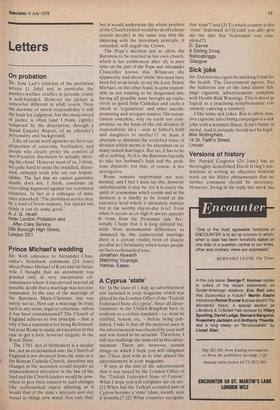Prince Michael's wedding
Sir: With reference to Alexander Chancellor's Notebook comments (24 June) about Prince Michael of Kent and his future Wife I thought that an annulment was granted only in very exceptional circumstances where it was proved beyond all possible doubt that a marriage was not consummated. In the case of the marriage of the Baroness Marie-Christine this was surely not so. How can a marriage be truly such in any sense, legal or otherwise, unless it has been consummated? The Church of England adheres to this principle — that is why it has a reputation for being Reformed: but trust Rome to make an exception in this case to get a foot, however elegant, in the Royal Door.
The 1701 Act of Settlement is a secular law, not an ecclesiastical one: the Church of England is not divorced from the state as is the Roman Catholic Church, therefore any changes in the accession would require an unprecedented alteration in the law of the land and the Church leaders would be powerless to give their consent to such changes (the ecclesiastical aspect affecting as it would that of the state's interests and vice versa) as things now stand. Not only that, but it would undermine the whole position of the Church (which would no doubt please certain people) in the same way that the tinkering with the hereditary principle, if extended, will engulf the Crown.
The Pope's decision not to allow the Baroness to be married in her own church, which is her entitlement after all, is pure spite on the part of the Pope and Alexander Chancellor knows this. Whatever she apparently said about 'clubs' this must have been felt as an insult, to say the least. Prince Michael, on the other hand, is quite reasonable in not wanting to be dragooned into having all possible issue brought up exclusively as good little Catholics and cocks a snook at 'regulations' and other uncompromising and arrogant stances. His renunciation complete, why on earth not compromise on the basis of the old division of responsibility idea — sons to father's faith and daughters to mother's? At least it attempts to diminish the wretched sense of division which seems to be attendant on so many mixed marriages. But no, it has to be all or nothing. As it is, the Baroness has only to take her husband's faith and the problems diminish; but that, of course, is her prerogative.
Rome remains opportunist not ecumenical, and I feel I must say this, however unfashionable it may be, for it is surely the spirit of ecumenism which counts and at the moment it is hardly to be found at the executive level where it ultimately matters but at the worthy day-to-day level. Even when it occurs as on high it always appears to come from the Protestant side. Personally I hope that it is long delayed for, aside from monumental differences as instanced by this controversial marriage, there is a certain vitality born of dissent peculiar to Christianity which keeps people on their ecclesiastical toes.
Jonathan Howarth Matching Vicarage, Harlow, Essex.


































 Previous page
Previous page